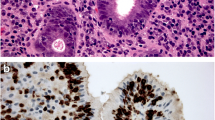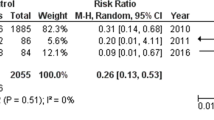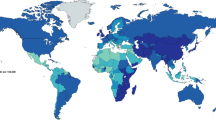Abstract
In a randomized controlled trial (RCT), 272 patients were assigned to lysine acetylsalicylate 160 mg/day (n = 73) or 300 mg/day (n = 67) or placebo (n = 132). The primary end points were adenoma recurrence and adenomatous polyp burden (APB) at year 1 or 4 (last colonoscopy) and at year 4. At last colonoscopy, APB tended to be lower under aspirin 160 mg or at either dose compared with placebo (P = 0.06 and 0.07, respectively). At year 4, 55 patients had received aspirin 160 mg/d, 47,300 mg/d, and 83 placebo. APB and proportions of patients with at least one recurrent adenoma were similar in both groups. A personal history of adenomas and an initial APB higher than 10 mm predicted recurrence. Among 219 adenomas from 136 patients, 128 adenomas (58%) from 59 patients strongly expressed COX-2 assessed by immunohistochemistry, mainly adenomas larger than 10 mm (84/129 vs 44/90; P = 0.02) and adenomas showing high-grade dysplasia (22/29 vs 104/188; P = 0.04). Deep stromal initial expression of COX-2 predicted recurrence (P = 0.04). Protection by aspirin was mainly observed in patients in whom COX-2 initial expression was low (RR: 0.59; 95% CI = 0.39–0.90; P = 0.02). Aspirin decreased adenoma recurrence significantly at 1 year, marginally at year 1 or 4, and not at year 4, possibly due to attrition but also to a differential effect according to polyp natural history. In a recent patient-level meta-analysis including the four published RCTs, aspirin significantly decreased adenoma risk by 17% and risk of advanced lesions by 28%.

Similar content being viewed by others
References
Papers of particular interest, published recently, have been highlighted as: • Of importance •• Of major importance
IARC Working Group on the Evaluation of Cancer Preventive Agents. Non-Steroidal Anti-Inflammatory Drugs. Lyon, International Agency for Research on Cancer. World Health Organization, 1997.
La Vecchia C, Negri E, Franceschi S, et al. Aspirin and colorectal cancer. Br J Cancer 1997; 76: 675–7.
Neugut AI, Rosenberg DJ, Ahsan H, et al. Association between coronary heart disease and cancers of the breast, prostate and colon. Cancer Epidemiol Biomarkers Prev 1998; 7: 869–873
Smalley W, Ray WA, Daugherty J, Griffin MR. Use of nonsteroidal anti-inflammatory drugs and incidence of colorectal cancer: a population-based study. Arch Intern Med 1999; 159: 161–166
Collet JP, Sharpe C, Belzile E, et al. Colorectal cancer prevention by non-steroidal anti-inflammatory drugs: effects of dosage and timing. Br J Cancer 1999; 81: 62–68.
Langman MJ, Cheng KK, Gilman EA, Lancashire RJ. Effect of anti-inflammatory drugs on overall risk of common cancer: case-control study in general practice research database. Br Med J 2000; 320: 1642–6.
Coogan PF, Rosenberg L, Louik C, et al. NSAIDs and risk of colorectal cancer according to presence or absence of family history of the disease. Cancer Causes Control 2000; 11: 249–55.
Kune GA, Kune S, Watson LF. Colorectal cancer risk, chronic illness, operations and medications: case-control results from the Melbourne Colorectal Cancer Study. Cancer Res 1998; 48: 4399–4404.
• Giovannucci E, Rimm EB, Stampfer MJ, et al. Aspirin use and the risk for colorectal cancer adenoma in male health professionals. Ann Intern Med 1994; 121: 241–6. In a large cohort, aspirin decreased the risk of colorectal cancer.
•• Giovannucci E, Egan KM, Hunter DJ, et al. Aspirin and the risk of colorectal cancer in women. N Engl J Med 1995; 333: 609–14. In the Nurses Health Study aspirin decreased the risk of colorectal cancer.
Muller AD, Sonnenberg A, Wasseman IH. Diseases preceeding colon cancer. A case control study among veterans. Dig Dis Sci 1994; 39: 2480–4.
Peleg II, Maibach HT, Brown SH, Wilcox CM. Aspirin and nonsteroidal anti-inflammatory drug use and the risk of subsequent colorectal cancer. Arch Intern Med 1994; 154: 394–9.
•• Chan AT, Giovannucci EL, Meyerhardt JA, et al. Long-term use of aspirin and nonsteroidal anti-inflammatory drugs and risk of colorectal cancer. JAMA 2005; 294: 914–923. In the large Nurses’ Health Study cohort, aspirin decreased the risk of colorectal cancer.
Cook NR, Lee IM, Gaziano JM, et al. Low-dose aspirin in the primary prevention of cancer: the Women’s Health Study: A randomised controlled trial. JAMA 2005; 294: 47–55.
• Chan AT, Ogino S, Fuchs CS. Aspirin use and survival after diagnosis of colorectal cancer. JAMA 2009; 302: 649–659. This article shows that regular aspirin use after colorectal cancer is associated with lower risk of cancer-specific and overall mortality, especially for tumors overexpressing COX-2.
Dubé C, Rostom A, Lewin G, et al. The use of aspirin for primary prevention of colorectal cancer: A systematic review prepared for the US preventive services task force. Ann Intern Med 2007; 146: 365–375.
Benamouzig R. Do aspirin or nonsteroidal anti-inflammatory drugs decrease the risk of colorectal cancer?. Gastroenterol Clin Biol 1998; 22: S22–7.
Gann PH, Manson JE, Glynn RJ, et al. Low-dose aspirin use and incidence of colorectal tumors in a randomised trial. J Natl Cancer Instit 1993; 85: 1120–24.
Sturmer T, Glynn RJ, Lee IM, et al. Aspirin use and colorectal cancer: post-trial follow-up data from the Physicians’ Health Study. Ann Intern Med 1998; 128: 713–20.
•• Sandler RS, Halabi S, Baron JA, et al. A randomized trial of aspirin to prevent colorectal adenomas in patients with previous colorectal cancer. N Engl J Med 2003; 348: 883–890. Erratum in N Engl J Med 2003; 348: 1939. Daily use of aspirin (325 mg/d) reduced the incidence of adenomas.
Baron JA, Cole BF, Sandler RS, et al. A randomized trial of aspirin to prevent colorectal adenomas. N Engl J Med 2003; 348: 891–899.
•• Logan RF, Grainge MJ, Shepherd VC, Armitage NC, Muir KR, ukCAP Trial Group. Aspirin and folic acid for the prevention of recurrent colorectal adenomas. Gastroenterology 2008; 134: 29–38. This randomized controlled trial using a 2x2 factorial design showed that aspirin (300 mg/d) but not folate reduced colorectal adenoma recurrence.
Flossmann E, Rothwell PM, on behalf of the British Doctors Aspirin Trial and the UK-TIA Aspirin Trial. Effect of aspirin on long-term risk of colorectal cancer: consistent evidence from randomised and observational studies. Lancet 2007; 369: 1603–1613.
• Giardiello FM, Yang VW, Hylind LM, et al. Primary chemoprevention of familial adenomatous polyposis with sulindac. N Engl J Med 2002; 346: 1054–1059. Standard doses of sulindac did not prevent the occurrence of adenomas in this randomized placebo-controlled trial.
• Steinbach G, Lynch PM, Phillips RKS, et al. The effect of celecoxib, a cyclooxygenase-2 inhibitor, in familial adenomatous polyposis. N Engl J Med 2000; 342: 1946–1952. In this randomized placebo-controlled trial, celecoxib (100 or 400 mg twice daily) reduced the number of colorectal polyps.
• Arber N, Eagle CJ, Spicak J, et al. Celecoxib for the prevention of colorectal adenomatous polyps. N Engl J Med 2006; 355: 885–895. Celecoxib (400 mg/d) reduced the occurence of adenomas within 3 years after polypectomy.
• Baron JA, Sandler RS, Bresalier RS, et al. A randomized trial of rofecoxib for the chemoprevention of colorectal adenomas. Gastroenterology 2006; 131: 1674–1682. Rofecoxib (25 mg/d) compared with placebo reduced the risk of adenomas but with serious toxicity.
• Bertagnolli M, Eagle CJ, Zauber AG, et al. Celecoxib for the prevention of sporadic colorectal adenomas. N Engl J Med 2006; 355: 873–884. In this randomized placebo-controlled trial, celecoxib (200 or 400 mg twice daily) reduced the risk of adenomas.
•• Chan AT, Ogino S, Fuchs CS. Aspirin and the risk of colorectal cancer in relation to the expression of COX-2. N Engl J Med 2007; 356: 2131–2142. This article suggests the role of COX-2 expression in aspirin’s preventive effect.
Benamouzig R, Deyra J, Martin A, et al. Daily soluble aspirin and prevention of colorectal adenoma recurrence: One-year results of the APACC trial. Gastroenterology 2003; 125: 328–336.
Benamouzig R, Yoon H, Little J, et al. APACC, a French prospective study on aspirin efficacy in reducing colorectal adenoma recurrence: design and baseline findings. Eur J Cancer Prev 2001; 10: 327–335
•• Benamouzig R, Uzzan B, Martin A, et al. Cyclooxygenase-2 expression and recurrence of colorectal adenomas: effect of aspirin chemoprevention. Gut 2010; 59: 622–629. This article describes the pathological findings of the APACC trial: overexpression of COX-2 predominating in large and high-grade dysplasia adenomas; deep stromal but not epithelial initial expression of COX-2 predicting adenoma recurrence; and aspirin not acting preferentially on patients whose initial adenomas strongly expressed COX-2.
Burn J, Bishop DT, Mecklin JP, et al. Effect of aspirin or resistant starch on colorectal neoplasia in the Lynch syndrome. N Engl J Med 2008; 359: 2567–2578
•• Cole BF, Logan RF, Halabi S, et al. Aspirin for the chemoprevention of colorectal adenomas: meta-analysis of the randomized trials. J Natl Cancer Inst 2009; 101: 256–266. This article is a patient-based meta-analysis of all four randomized placebo-controlled trials of secondary prevention of colon adenomas by aspirin, showing its effectiveness.
Disclosure
No potential conflicts of interest relevant to this article were reported.
Author information
Authors and Affiliations
Corresponding author
Rights and permissions
About this article
Cite this article
Benamouzig, R., Uzzan, B., Deyra, J. et al. Prevention by Aspirin of Colorectal Adenoma Recurrence: Some Advances and Latest Results of the APACC Trial. Curr Colorectal Cancer Rep 7, 33–41 (2011). https://doi.org/10.1007/s11888-010-0079-5
Published:
Issue Date:
DOI: https://doi.org/10.1007/s11888-010-0079-5




